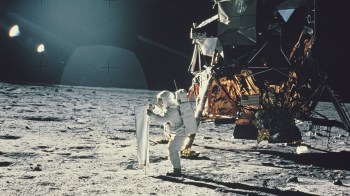A ‘perfect landing’ for the economy?
Share Now on:
A ‘perfect landing’ for the economy?
KAI RYSSDAL: We spent most of the economic year gone by hearing this phrase. Soft landing. It’s what policy makers have been aiming for.
Think of it like this: the Federal Reserve’s been trying to steer clear of inflation, using its interest-rate controls to nudge the wing flaps of the economy first a little this way, then a little that way.
And it seems to be working even better than they dared hope. We saw a headline in the Wall Street Journal today guessing the economy might be headed for a “perfect landing.” We asked Marketplace’s Bob Moon to have a look at what that might mean.
BOB MOON: Place your seat backs and tray tables in the upright and locked position. The economy is on approach.
PASSENGER ANNOUNCEMENT: Somewhat surprising, this is only about 13 minutes later than our scheduled arrival, so with some very fortunate winds, we are not too terribly late.
It appears unexpectedly healthy consumer spending has managed to overcome the headwinds created by the slumping housing and auto industries. Mark Zandi at Moody’s Economy.com sees some turbulence in the early part of the year, but agrees with the idea of a “perfect landing.”
MARK ZANDI: Growth will be close to the economy’s potential — about 3 percent real GDP growth. It means that unemployment will remain low, south of 5 percent, which is considered to be full employment. And it means that inflation will be below the Fed’s target.
[SOUND OF JET LANDING/WHEEL TOUCHDOWN]
Anything short of a recession might be considered a successful landing, but Standard & Poor’s chief economist David Wyss isn’t yet convinced it’ll be right on the mark
DAVID WYSS: A perfect landing, to me, is one that occurs with no bounce. Basically, they raise interest rates, the economy comes in for a landing, and they can just leave interest rates right where they are, forever. But I still think they’re going to have to cut rates around mid-year.
Wyss points out it’s hard to predict landing conditions:
WYSS: There’s certainly a lot of potential for severe crosswinds as they land.
PASSENGER ANNOUNCEMENT: Once the seat belt sign has been turned off, it is then safe to move about the cabin.
WYSS: That’s one of the problems: even if the Fed manages things perfectly based on what they know, based on what the economy is going to do, you’re always going to get some kind of an outside shock that hits the economy, one way or the other.
So a perfect landing still depends, he says, on oil prices, for example, or the lingering threat the dollar’s value could slide too far.
In Los Angeles, I’m Bob Moon for Marketplace.
There’s a lot happening in the world. Through it all, Marketplace is here for you.
You rely on Marketplace to break down the world’s events and tell you how it affects you in a fact-based, approachable way. We rely on your financial support to keep making that possible.
Your donation today powers the independent journalism that you rely on. For just $5/month, you can help sustain Marketplace so we can keep reporting on the things that matter to you.


















